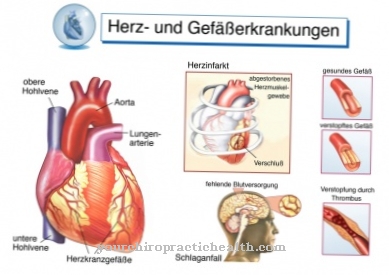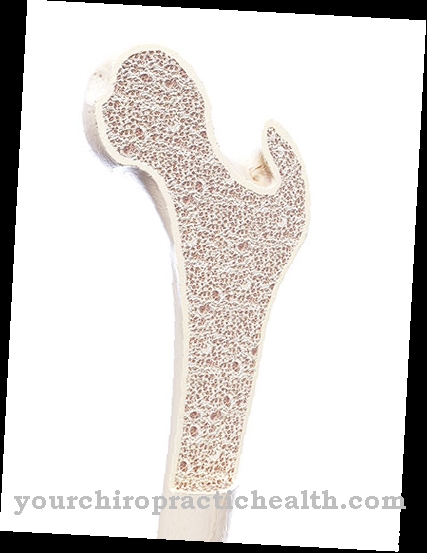As hereditary angioedema is a rarely occurring hereditary disease. Those affected repeatedly suffer from edema formation.
What is hereditary angioedema?

© tampatra - stock.adobe.com
Hereditary angioedema is an autosomal dominant hereditary disease, in the course of which angioedema (Quincke's edema) repeatedly forms. The disease is a special form of Quincke's edema. Hereditary angioedema is characterized by swellings that form on the skin, mucous membranes and internal organs.
It is estimated that one in 10,000 to 50,000 people has the hereditary disease. However, it is likely that the number of unreported cases is significantly higher. Women and men are equally affected. The disease was first described in 1882 by the German internist Heinrich Irenaeus Quincke (1842-1922).
In earlier years the disease was called hereditary angioneurotic edema. However, since there is no neurological influence on the development of the disease, the term hereditary angioedema became established over time.
causes
Hereditary angioedema is caused by a genetic defect. This causes a deficiency in the C1 esterase inhibitor (C1-INH). This fulfills the task of activating the complement system. There are more than 200 mutations in total. Either too little of the C1 esterase inhibitor is produced or malfunctions occur.
The lack of the C1-esterase inhibitor causes edema to develop within the complement system and the contact system of blood coagulation. It is assumed that the peptide bradykinin plays a crucial role in the contact system. The release of bradykinin takes place at the end of a sequence of reactions, which is the body's response to injury.
The bradykinin causes more fluid to pass from the vessels into the tissue. This can lead to edema (water retention). Bradykinin also dilates the vessels and causes muscle contractions that lead to pain and cramps. The C1 esterase inhibitor normally limits the release of bradykinin. Due to the deficiency, however, considerably more of the peptide can be released than is required.
In some cases, autoimmune diseases are responsible for a deficiency in the C1 esterase inhibitor. However, this is not hereditary, but acquired angioedema. Sometimes drugs such as ACE inhibitors also trigger severe attacks of edema.
The reason for this is their influence on the bradykinin metabolism. In some patients, no specific causes for the disease can be found. Doctors then speak of idiopathic angioedema.
You can find your medication here
➔ Medicines against edema and water retentionSymptoms, ailments & signs
In principle, hereditary angioedema can occur at any age. Most often, however, it shows up in the first two decades of life. 75 percent of all patients before the age of 20 suffer from symptoms. The attacks are particularly common during puberty and in young adults.
Taking birth control pills is considered to be the trigger in young women who have previously been inconspicuous. But it is also possible to provoke the attacks through triggers that cannot be recognized. This particularly includes fear, stress and minor injuries. A typical symptom of hereditary angioedema is the appearance of large-scale edema on the skin.
The water retention can also show up in the airways or in the gastrointestinal tract. If hereditary angioedema forms in the larynx, there is even a mortal danger. The frequency of edema attacks varies greatly from patient to patient.
For some people they appear once a week, for others only once a year. A typical indication of hereditary angioedema is the absence of itching. The edema attacks usually last three to five days. It is not possible to predict when the next edema will appear.
Diagnosis & course
The symptoms of hereditary angioedema are similar to the symptoms of intestinal colic or allergies, which are more common. For this reason, the rare disease is often discovered late. If the edema does not respond to the administration of cortisone or antihistamines, this is considered an important indicator of the disease.
This makes it possible to differentiate from allergies. If edema attacks only occur within the gastrointestinal tract, diagnostics are particularly difficult. The patient's medical history also provides important information. Otherwise he needs a laboratory analysis for an exact diagnosis.
In this context, the C1-INH deficiency is not proven, but rather low values of the complement factor C4. Its consumption takes place in the complement system reaction chain of the physical defense. Because the regulation of the C1 esterase inhibitor does not take place, the C1-INH is permanently overactive.
Hereditary angioedema can take a dangerous course when it comes to seizures within the airways. Swelling of the mucous membrane of the windpipe is one of the most common causes of death in patients.
Complications
In most cases, this condition only affects young adults or people through puberty. Women who take birth control pills are particularly often affected by the symptoms. This leads to anxiety, panic attacks and excessive stress. These complaints generally have a very negative effect on the patient's body and can lead to psychological complaints.
Edema also develops and can cover the entire body. It is not uncommon for life-threatening situations to arise if the water retention in the stomach or in the respiratory tract forms. In the worst case, the affected person can die without treatment. As a rule, this will also reduce life expectancy if the symptoms are not treated by a doctor.
In most cases, treatment of the disease is relatively straightforward, with no particular complications. The treatment takes place primarily with the help of medication and can severely limit the symptoms. However, the affected person is usually dependent on lifelong therapy, as the disease cannot be treated causally.
When should you go to the doctor?
If changes in the mucous membranes in the mouth and throat are noticed, a doctor should be consulted. This is especially true in the case of persistent complaints that do not seem to subside. If there is a specific suspicion of hereditary angioedema, a doctor must be consulted immediately. Symptoms such as swallowing difficulties, shortness of breath and palpitations should be clarified.
Persistent heart rhythm disturbances indicate a serious condition that needs to be investigated and treated immediately. Medical advice is required at the latest when severe pain, gastrointestinal complaints or fever symptoms occur. If in doubt, the patient should go to a hospital. If hereditary angioedema is left untreated, it may cause shortness of breath, bleeding, and other serious complications that require emergency medical attention.
Quincke's edema occurs mainly after taking ACE inhibitors and generally in allergic reactions. Patients who regularly take medication, allergy sufferers and the chronically ill should see their doctor immediately with the symptoms mentioned. In addition to the family doctor, the dermatologist or an internist are also available.
Doctors & therapists in your area
Treatment & Therapy
The treatment of hereditary angioedema is divided into therapy for acute symptoms and long-term prophylaxis. During the acute phase, the development of the edema should be stopped as quickly as possible. For this purpose, the patient in Germany usually receives a C1-INH concentrate. This consists of donor blood and is administered intravenously.
If necessary, freshly frozen blood plasma containing C1-INH can also be administered. A recombinant C1-INH preparation that works without donor plasma is now also available in Germany. If the edema attacks show up at least once a month, long-term prophylaxis is required. In addition, mostly male sex hormones are used, which increase the production of C1-INH.
Outlook & forecast
Without treatment, hereditary angioedema leads to a reduction in life expectancy. Oedemas of the skin and mucous membranes occur again and again, which under certain circumstances can be acutely life-threatening. This is especially the case if the swelling occurs in the upper airways. Then there is a risk of suffocation. Where and when the edema will appear can never be predicted. Edema in the gastrointestinal tract causes severe colic.
The seizures come unprepared. They can occur once a year or once a week. Any attack can be potentially fatal. As the name suggests, it is a congenital disease that is genetic.
Due to a genetic defect, minor injuries, irritations, infections or medical interventions suddenly lead to increased permeability of the affected vessels, so that fluid can escape into the surrounding tissue with the formation of a swelling. Due to the rarity of the disease, it is often not diagnosed or diagnosed too late.
In diagnosed cases, long-term therapy with androgen derivatives (danazol) or the bradykinin receptor antagonist icatibant can be started. This effectively prevents sudden edema formation. Danazol was taken off the market in Germany in 2005 because it causes benign liver tumors. Before surgery or dental treatment, a C1-INH concentrate must be administered for prophylaxis shortly before the procedure. However, the patient should always be prepared for acute therapy in the event of a sudden attack.
You can find your medication here
➔ Medicines against edema and water retentionprevention
Hereditary angioedema is one of the hereditary diseases. Therefore there are no preventive measures.
Aftercare
In most cases, the person affected has very few or no special measures and options for follow-up care. The person concerned must contact a doctor at an early stage so that there are no further complications or further worsening of the symptoms. Since this is a hereditary disease, it cannot be treated fully.
However, if you want to have children, genetic testing and counseling can be carried out to prevent the disease from recurring in the children. Self-healing cannot occur. In most cases, this disease is treated with blood transfusions, which must be done monthly.
It is important to ensure that it is used regularly so that there are no further complications. Further treatment measures cannot be carried out. Furthermore, those affected with this disease often need the support of the whole family and friends.
This can also prevent psychological upsets or depression, whereby intensive and loving discussions can also have a positive effect on the course of the disease. No general prediction can be made about the life expectancy of the person affected.
You can do that yourself
Hereditary angioedema must definitely be clarified and treated by a doctor. In addition to the medical measures, self-treatment is also possible in some cases.
The most important step is to correct the triggering circumstances. For example, if the edema was triggered by a certain drug, this must be discontinued and replaced with another drug. A typical trigger is the birth control pill, which should be discontinued if symptoms occur, advisable in consultation with the gynecologist in order to avoid possible complications.
Alternatively, attempts can be made to avoid so-called triggers - possible triggers for an attack. These include, for example, stress, fears and minor injuries. If one of the symptoms mentioned should nevertheless occur, you must speak to your family doctor or a dermatologist immediately.
If hereditary angioedema is treated with medication at an early stage, in many cases it disappears on its own and does not require independent treatment. Since such edema can recur, preventive measures should be taken. This includes avoiding the triggers mentioned as well as regular visits to the doctor and a healthy lifestyle with a balanced diet and sufficient exercise.



.jpg)








.jpg)



.jpg)










.jpg)
